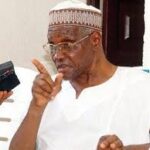Amidst a relentless onslaught on schools by terrorist groups across Nigeria, a new report exposes the harrowing toll of insecurity on education in the nation.
Titled “Insecurity and Education in Nigeria: The Context and Challenges,” the report compiled by the International Organization for Peace Building and Social Justice (PSJUK) unveils the stark reality faced by students, educators, and families.
Signed by PSJ-UK CEO, Ayo Adedoyin, and IA Foundation Founder CEO, Ibironke Adeagbo, the report’s introduction lays bare the heart-wrenching human suffering endured amidst the crisis, coupled with a glaring lack of decisive action.
The numbers tell a chilling tale: Schools are under siege, forcing closures and rendering countless children unable to access education. Nigeria, with its staggering 15 percent share of the global out-of-school children population, witnesses a staggering 1.6 million children deprived of education in the Northeast alone.
Recent incidents, like the mass abductions in Kaduna and Katsina states, epitomize the terror inflicted upon innocent students. Tragically, lives are lost, as evidenced by the death of a teacher abducted alongside students in Kaduna.
Beyond the individual tragedies, the report warns of far-reaching consequences for Nigeria’s development. A generation deprived of education faces a bleak future, with limited prospects and global competitiveness. Moreover, the ripple effects extend beyond Nigeria’s borders, with migration emerging as a looming concern.
Despite commendable efforts by national and international stakeholders, progress remains elusive. Military operations, peace negotiations, and education reforms have faltered in the face of entrenched insecurity.
The time for action is now. Nigeria stands at a critical crossroads, demanding urgent intervention to address the intertwined crises of insecurity and education. Failure to act risks condemning an entire generation to the vicious cycle of poverty and ignorance.
In response, the report issues a clarion call to action. It urges national and international actors to adopt a holistic approach, combining robust security measures with investments in education infrastructure and inclusive governance.
“The human tragedy unfolding amidst insecurity demands our immediate attention,” states the report. “Together, we must prioritize education as the cornerstone of Nigeria’s future prosperity.”
As the report underscores, the path to stability and progress begins with safeguarding the right to education for all Nigerians. It is a call to action we cannot afford to ignore.

 Join Daily Trust WhatsApp Community For Quick Access To News and Happenings Around You.
Join Daily Trust WhatsApp Community For Quick Access To News and Happenings Around You.


